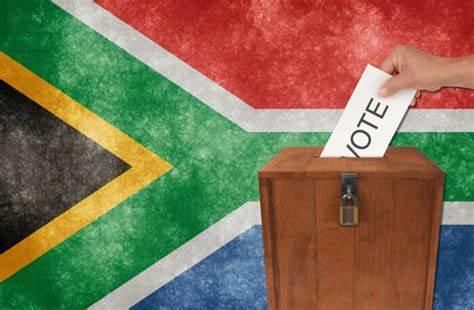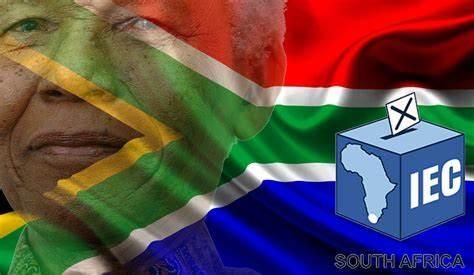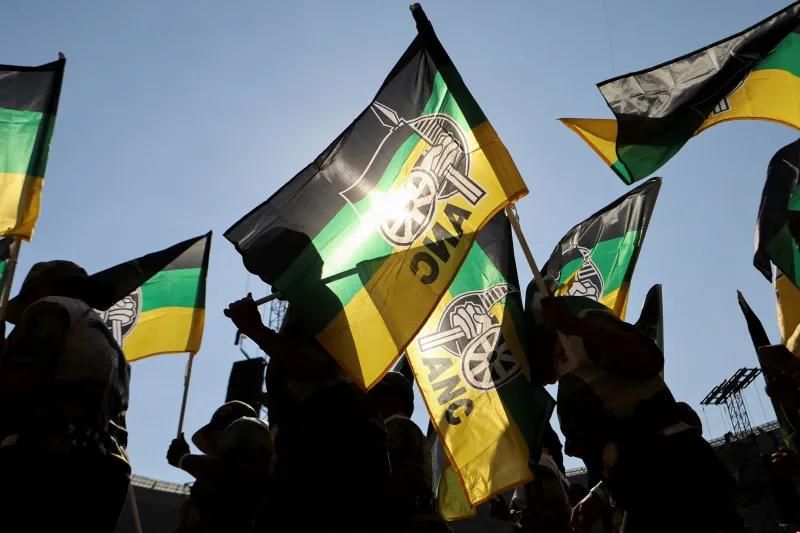By Eric Vandenbroeck and co-workers
South Africa's Election
Tomorrow May
29, South Africa is scheduled to hold its most consequential election in
decades. Since the end of white rule in 1994, the African National Congress—the
liberation movement that toppled apartheid—has dominated South African
politics, holding a majority in the parliament and the presidency. Thirty years
later, the ANC is at risk of losing its parliamentary majority. In South
Africa’s last general election, in 2019, the ANC won 58 percent of the
parliament votes; in April, however, only 40 percent of registered voters that
Ipsos polled backed the party—a dramatic decline. Other polls conducted over
the past several months have shown the ANC winning the support of no more than
45 percent of voters.
If the ANC’s vote
share does fall below 50 percent, as seems probable, the party will have to
enter into a coalition of necessity. This will mean sacrificing key cabinet
positions, some of its policy agenda, or both. Many observers suggest that such
tradeoffs will inaugurate a potentially frightening shift in South Africa’s
post-apartheid history. A coalition government will certainly represent a
dramatic symbolic change: the epoch of ANC dominance will end, and it is
unlikely that the party could regain an outright majority in the parliament.
Coalition politics will also represent new political uncertainty in South
Africa, as no one can predict how long any national coalition will survive.
But behind this
prospect of upheaval, this election will preserve more than it overturns. The
nature of coalition politics and, in particular, how that form of politics is
likely to unfold in South Africa makes it unlikely that the government’s
overall policy orientation will change. The ANC will remain the biggest force
in South African politics, and a new government, no matter its composition,
will almost surely continue the current approach to economic and foreign
policy. Many who plan to vote against the ANC are not doing so to destroy the
party but to jolt it out of its complacency. Such continuity will be double
edged: certain institutions key to preserving South Africa’s democratic nature
will remain intact, and policy will be relatively predictable, meaning the
country will stand a better chance of avoiding outright state failure. But in
South Africa, continuity also means the conservation of long-running problems:
rampant unemployment, grinding poverty, and shocking economic inequality—all
still undergirded by racial injustice.
Slow Burn
The ANC entered this
election season weak. After taking the reins in 1994, the party promised to
build a democratic, just, and prosperous society antithetical to the country’s
apartheid past. But the ANC’s historical narrative, so deeply intertwined with
South Africa’s liberation, has struggled to resonate with a younger electorate
less enchanted by the party’s past glories than frustrated with the country’s
present setbacks.
Decades of poor
governance have tarnished the party’s image, along with persistent and credible
allegations of corruption. The tenure of South Africa’s third ANC president,
Jacob Zuma, was marred by the infamous Nkandla scandal—in which he was accused
of using public funds to upgrade his private residence—and even more serious
and extensive allegations. Government inquiries revealed that Zuma encouraged
private firms and families to gain undue influence over government appointments
and decisions.
Although corruption
has been a significant issue for the ANC, it is not the party's only problem.
The ANC has also failed to deliver on promises to reform the economy and bring
social equity, with South Africa’s unemployment nearing 34 percent in the first
quarter of 2024. Economic inequality has not budged for decades. Tragically,
over half of the population still lives in poverty. The ANC has struggled to
implement effective policies to address any of these problems thanks to
internal factionalism, inadequate governance, and resistance from entrenched
economic interests.
In South Africa’s
last general election, voters backed Cyril Ramaphosa, a union organizer turned
tycoon who replaced Zuma as the head of the party. In most post-apartheid
elections, South Africans have longed for bold change even as they supported
the ANC, and Ramaphosa succeeded in convincing voters that a “new dawn” was
breaking in the country. He promised to renew the party by dealing decisively
with corruption and creating millions of new jobs.
But Ramaphosa largely
failed to arrest the ANC’s decline. He retained colleagues facing corruption
allegations in his cabinet and lost personal credibility after it was
discovered, in 2020, that $580,000 in cash had been stolen from his luxurious
ranch—cash that had been hidden inside a couch. As a general rule, it is never
a good thing for presidents to be found with large quantities of foreign
currency stuffed in their furniture.
Ramaphosa, in truth,
was always destined to falter. His promise of a new era was overshadowed by his
roots in the old one. By the time he became president, Ramaphosa had been an
ANC grandee for three decades and had served as Zuma’s deputy from 2012 to 2018.
Rather than making bold moves on South Africa’s governance or economy,
Ramaphosa focused on reuniting his fractured party. After the cash-in-the-couch
scandal, Ramaphosa seemed to drift into a daze; his eyes lost their sparkle and
his laugh lost its joy, and he bore all the signs of a president exposed. South
Africans began to distrust that Ramaphosa could really remake the ANC—or their
country.

Split Decision
On the ANC’s right
flank, the Democratic Alliance (DA) has been campaigning on clean governance
and a more market-led economy. But it cannot shake the impression that it is a
party for white interests. On the ANC’s left flank, the Economic Freedom Fighters,
a newer party baying for land reform and big government, has torn into the
ANC’s failure to resolve racialized inequalities. But the EFF cannot shake
popular misgivings about its sincerity or its capacity to translate promises
into action.
The ANC knew it would
face these challenges from the right and the left. In December 2023, however,
the ANC’s situation worsened with the emergence of a new party, the MK, formed
by Zuma himself. During Ramaphosa’s presidency, Zuma was sentenced to 12 months
in prison for contempt of the country’s highest court after refusing to testify
before an anticorruption commission. This development split the ANC, which for
two years battled reconciling support for Zuma with adherence to the court’s
order.
The new party’s name
was a deliberate jab at the ANC: uMkhonto
weSizwe, or MK for short, had been the name of
the ANC military wing that resisted apartheid. Zuma was signaling that the “ANC
of Ramaphosa” had abandoned its revolutionary mantel. MK has joined the EFF in
calls for land reform, free education, and Ramaphosa’s demise. And it is now
set to shave off as much as ten percent of the ANC vote—a startling number,
given that the MK has only existed for six months. But that vote share reflects
just how disappointed many South Africans have become with Ramaphosa’s ANC.
Fundamentally, South
African voters now face a choice between an unsatisfactory status quo and an
uninspiring range of alternatives. They want ethical governance and basic
services, and they also want to address the legacy of racial injustice. No
single party offers both at once. When the ANC loses its majority, it will
therefore face a critical decision. It can either ally with the left-leaning
EFF and MK, or it can align with its more conservative adversary, the DA.
Static Equilibrium
Each choice
represents a significant symbolic shift. If it joins forces with the DA, the
ANC will be embracing moderate, market-led politics; if it aligns with the EFF
and the MK, it will appear to lean into radical change. Yet neither realignment
is likely to trigger a real, drastic adjustment in South Africa’s domestic or
foreign policy. For better and for worse, the fundamentals that define South
Africa—its economic and special inequalities, its high unemployment, its
constitutional framework, its judicial independence, its poor governance, and
its nonaligned foreign policy—will remain intact. The immediate priority for
any ruling coalition will be survival, not ambitious reform. This need to
secure and maintain power among diverse political factions will inherently
foster a conservative approach to governance, emphasizing cautious, incremental
changes over transformative reforms.
Countries such as
Italy and Germany illustrate how coalition governance often leads to stability
beneath a veneer of political clamor. In Italy, the frequency of coalitional
changes has left the country’s core economic and political policies intact. In
Germany, coalition governments have balanced various party priorities, ensuring
gradual shifts with a long-term perspective.
There is simply no
political will within the ANC to implement major changes to economic policy. So
it will likely resort to making symbolic concessions to its coalition partners.
Even an alliance with the EFF and the MK is unlikely to result in radical policy
shifts, despite potential changes in rhetoric. Zuma governed as a centrist
during his presidency, and the EFF has already started presenting its economic
reforms in more moderate terms. The responsibilities of governance tend to
moderate radicalism, as they did in the case of the ANC, and the same kind of
moderation would likely happen to a leftist coalition. The DA would face a
similar struggle to overturn longstanding ANC policies. Affirmative action is
popular, and reversing it would create unnecessary conflict within a coalition
government. Cutting public-sector wages would provoke a similar backlash.
Coalitions can enhance accountability and tweak policies at the margins, but
they cannot fundamentally alter South Africa’s trajectory.
South Africa’s
essential foreign policy stance is also unlikely to change: the country will
continue to try to balance both its partners in the BRICS—the intergovernmental
organization comprising South Africa as well as Brazil, Russia, India, and
China and new members Egypt, Ethiopia, Iran and the United Arab Emirates—and
its partners in the West. This diplomatic balancing act seeks to avoid
alienating any major bloc, meaning that South Africa will neither fully embrace
nor fully antagonize its American, Chinese, European, or Russian partners. The
country is likely to maintain a neutral stance on Ukraine and voice its
opposition to perceived aggressions, such as those committed by Israel in Gaza.
It will continue to call for reform to multilateral institutions from within.

Hidden Assets
Some analyses that
tout a huge shift in South Africa anticipate that shift will be positive: if
the ANC’s vote share drops below 50 percent, the argument goes, that will give
the party a huge and much-needed shock, altering its attitudes and internal governance. Other
observers fear the rise of left-wing parties, in particular, and worry that the
struggle to build coalitions between such disparate political forces will
plunge the country into chaos.
The ANC could, of
course, cling to its majority. But even if it does, it will exit this election
a much-diminished force. In this scenario, the ANC would still hold national
power. But it would still face the prospect of coalition government in key
provinces such as the all-important economic hub of Gauteng and the populous
coastal region of KwaZulu Natal, where its decline appears all but certain.
The new coalition era
in South Africa may well provide a vital opportunity for institutional
strengthening, particularly within the parliamentary system. For nearly three
decades, the ANC’s dominance allowed it to expedite decisions through
parliament, often sidestepping robust debate and scrutiny. During its
corruption scandals, the ANC has shielded its presidents from accountability.
With no single party in control, however, South Africa’s parliament, its top
court, and other accountability mechanisms can become more effective and
assertive. Key functions such as budget approvals, corruption investigations,
and motions of no confidence against the president will now be subject to more
rigorous oversight and debate. If South Africa had coalition politics during
the Nkandla scandal, Zuma would likely have been booted from office long before
he was, and Ramaphosa would have faced much more accountability over the
contents of his couch.
Understanding this
election’s consequences will be an exercise in distinguishing the substance
from the surrounding commotion. Coalitions will rise and fall, yet all this
instability will occur inside a framework that promotes long-term stability.
When the ANC loses its historical dominance, South Africa is likely to continue
on the same trajectory it has maintained for the past 30 years—for worse and
for better.
An African National Congress rally, Johannesburg,
South Africa, May 2024

For updates click hompage here